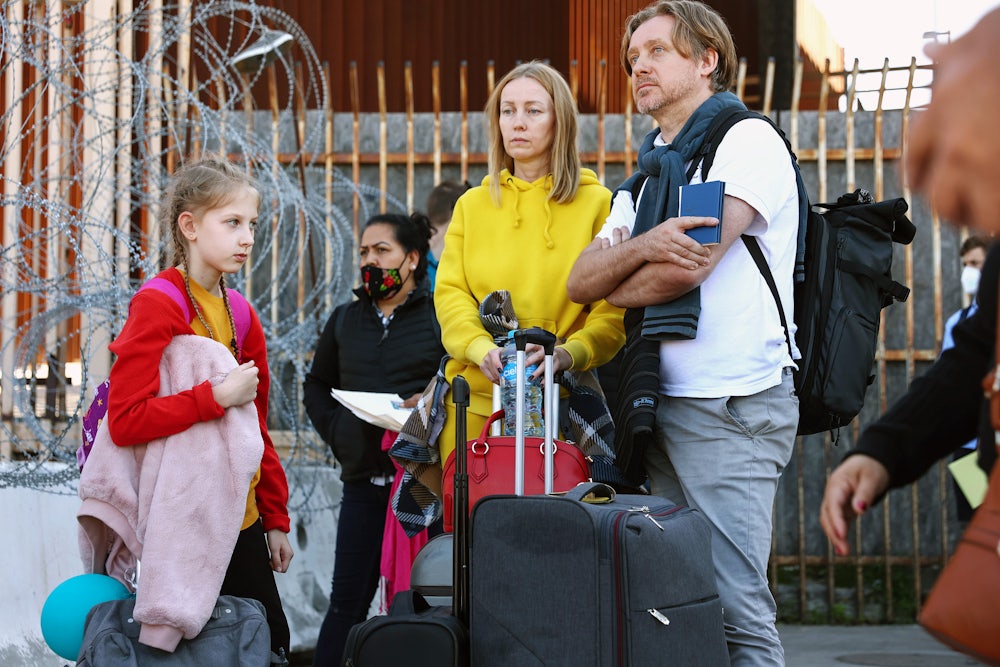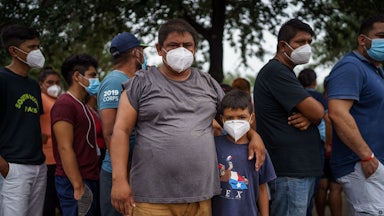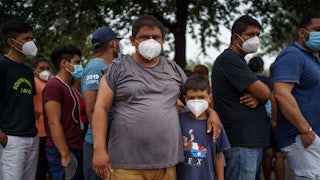The Biden administration is expected to lift a public health order granting border officials the authority to expel migrants quickly, regardless of whether they are seeking asylum, according to reports published on Wednesday. The move comes amid substantial outcry over the humanitarian implications, as well as competing political concerns about a potential increase in illegal crossings that may follow in the wake of the White House’s decision.
The order, known as Title 42, was invoked by the Trump administration two years ago this month, citing concerns about the spread of Covid-19. Despite campaign promises from President Joe Biden that he would roll back Trump’s immigration policies, the order has hitherto remained in place and was repeatedly renewed by his administration for two years. But other coronavirus restrictions were steadily rolled back across the country over the past several months, which raised questions as to why this one remained in place. The Centers for Disease Control and Protection is expected to end the rule by late May, according to several news reports, although the administration has not yet announced its decision. It’s also possible that some Republican-led states will file lawsuits challenging the lifting of Title 42, which could delay the rollback of the policy.
“This was never justified, and it was just a nullification of our asylum laws,” said Karen Musalo, director of the Center for Gender and Refugee Studies at the University of California Hastings College of the Law.
According to data from Customs and Border Patrol, there have been roughly 1.7 million migrant expulsions using Title 42 since it was first implemented in March 2020. The majority of these deportations occurred during the Biden administration. Human Rights First, an immigrant advocacy group, found that these expulsions had resulted in nearly 10,000 instances of kidnapping, torture, rape, and other violent attacks on migrants.
Critics have argued that the injustice of the policy, issued by the CDC, can be seen in the exceptions made for refugees fleeing the violence in Ukraine. A recent memo from Customs and Border Patrol, obtained by Politico, authorized officials on a case-by-case basis “to except Ukrainian nationals at land border ports of entry from Title 42.” Vice World News reported this week that 35 asylum-seekers from Russia camped out at the southern border had been granted entry into the United States, bypassing Title 42. The CDC had 60 days to evaluate whether to extend the policy after its previous renewal in January, concluding its review by Wednesday.
“Ukrainians are fleeing conflict and violence, and there are others at the U.S. southern border, who equally deserve to be able to access asylum. And I think proceeding on an exceptional basis delivers some solace and some protection to Ukrainians. But there are many others at the southern border who deserve the same,” said Monette Zard, an associate professor and director of the Program on Forced Migration and Health at Columbia University’s Mailman School of Public Health. Zard belongs to a group of public health experts that had urged the Biden administration to end the use of the policy.
Homeland Security officials told reporters on Tuesday that they are expecting a surge in border arrivals if the policy is lifted, and have contingency plans for multiple scenarios, including one where they would manage as many as 18,000 migrant encounters at the border per day. “We need to be prepared for what we’re considering a potential contingency, which is that the lifting of Title 42 could increase flows,” a senior DHS official told reporters. White House communications director Kate Bedingfeld told reporters that the administration expects to see higher numbers of migrants arriving at the border when the CDC decides to lift the order. “We are planning for multiple contingencies, and we have every expectation that when the CDC ultimately decides it’s appropriate to lift Title 42, there will be an influx of people to the border,” Bedingfield said Wednesday.
Border crossings are at historic highs, and immigration officials have encountered migrants more than 900,000 times since October. However, CBP has also found that the high number of expulsions during the pandemic contributed to multiple border crossing attempts, meaning that the number of total encounters overstates how many individuals have arrived at the border. Representative Veronica Escobar of Texas told The New Republic that she believed Title 42, counterintuitively, had done more to spread the coronavirus because it resulted in more attempts at multiple crossings, meaning that it “increased the spread of Covid and put our border patrol agents and migrants at greater health risk.”
The basis for the order has been questionable since its inception. The policy was spearheaded by Stephen Miller, a top aide to Trump who vehemently pressed to restrict legal and illegal immigration, and who had previously attempted to invoke public health to bar migrants from crossing the border even before the coronavirus pandemic. The former principal deputy director of the CDC said in congressional testimony last year that “the bulk of the evidence at that time” did not support the implementation of the order. Dr. Anthony Fauci also said late last year that transmission of the virus is “not driven by immigrants” and that expelling migrants “is not the solution to an outbreak.”
“The virus does not preferentially choose to infect asylum-seekers rather than students or businesspeople or Ukrainian refugees, all of whom are allowed to cross the border,” Ronald Waldman, professor emeritus at the Milken Institute School of Public Health at George Washington University, told The New Republic. Waldman, who worked as an epidemiologist at the CDC for more than 20 years and is now president of Doctors of the World-USA, also belongs to the group of experts calling for an end to the policy. “This is a selective ban on a selective group of people who are primarily people of color, and it just does not make any sense from a public health point of view, in terms of providing additional protection.”
Zard expressed concern that the use of the policy would undermine the credibility of the CDC, saying that she hoped the agency would conduct some “soul-searching” when the policy is lifted. She said, “I think by not following science, by allowing themselves to be put in a position where public health was used effectively as a form of immigration control, that they have undermined trust in what the CDC says.”
The policy has come under renewed scrutiny in light of recent lawsuits that highlight the inconsistency of the order’s implementation. Earlier this month, a federal judge questioned the public health basis for the policy in a decision barring the Biden administration from expelling families to countries where they could be harmed. “This is March 2022, not March 2020,” noted Judge Justin Walker of the U.S. Court of Appeals for the D.C. Circuit, adding that the order “looks in certain respects like a relic from an era with no vaccines, scarce testing, few therapeutics, and little certainty.” In a separate ruling, a federal judge in Texas blocked the Biden administration from exempting unaccompanied migrant children from the policy, calling it “arbitrary and capricious,” and noting that migrant children could spread Covid-19 just as well as any other migrant. The CDC ended the order for unaccompanied migrant children one week later, citing coronavirus mitigation efforts for undocumented children at the border.
Advocates say that an acknowledgment of the legal right to ask for asylum gets lost in the debate. Allen Morris, senior policy and government affairs strategist at RAICES Texas, a nonprofit providing legal services for refugees, said that both parties were failing to understand the human element of immigration and, specifically, of seeking asylum. “To come to the border and to ask for asylum is not criminal. It is 100 percent legal. And I think that that’s something that people need to understand,” he said.
The United Nations High Commissioner for Refugees has repeatedly denounced the use of Title 42 to bar migrants from entering the U.S. without considering asylum needs. The use of the order garnered international attention again last fall, when images and videos surfaced of CBP agents on horseback forcefully confronting Haitian migrants. Thousands of Haitian migrants have been denied entry under Title 42, and several human rights organizations joined to condemn the policy and the treatment of Haitian migrants.
Many Democratic lawmakers have repeatedly pressed Biden to end the use of Title 42 to expel migrants. A group of Democratic representatives and senators sent a letter to the Biden administration in February asking him to end its use, pointing to the treatment Black migrants receive at the border. A recent report by the Black Alliance for Just Immigration and NYU School of Law Immigrant Rights Clinic found that Black migrants face a higher rate of deportation than migrants of any other race. A group of House Democrats also sent a letter in February demanding that the Department of Homeland Security and the CDC provide an explanation for why asylum-seekers are treated as a public health threat, and some members reiterated their call to end the use of the order after the administration suspended deportation flights to Ukraine in light of the humanitarian crisis there.
On Wednesday, the Congressional Hispanic Caucus sent a letter to administration officials calling for an end to Title 42. “It is long overdue to completely end the Trump-initiated Title 42 policy and stop using the pandemic as an excuse to keep it going. Transmission rates are low, there are safe testing and quarantining protocols, and vaccines are readily available. End Trump’s Title 42 now,” Representative Raul Ruiz, the chair of the CHC, said in a statement.
But some Democrats have urged caution in ending the use of Title 42. There have been no major policy changes in processing migrants, nor has there been an increase in holding facilities for them. There is a backlog of more than 1.7 million cases in immigration courts. Arizona Senators Kyrsten Sinema and Mark Kelly sent a letter last week asking the administration to put a plan in place to manage border crossings and migrants’ claims of asylum before ending the policy. Although the senators say the policy “should not be in effect indefinitely,” they worry that ending it abruptly would “significantly increase the strain on DHS, border communities, and local nonprofits that are already near or at capacity.” Kelly told The New Republic on Tuesday that the White House needs to come up with a plan to provide “an orderly process at the border.”
Representative Pete Aguilar told The New Republic on Tuesday that the White House should ensure that “whatever steps we do, we have plans to deal with the potential eventualities.… We support them reforming the process and making sure that individuals receive a decision and justice based on their own individual circumstances. But that has to start with a plan to execute the idea, to execute the policy and to deal with the outcomes of that policy change.” Aguilar said, “We hope that Congress is a part of that, both from a financial and fiscal perspective as well as a [humanitarian] perspective.”
Senator Joe Manchin, another moderate Democratic senator, sent a letter to CDC Director Rochelle Walensky on Tuesday urging the CDC to extend the policy. “With encounters along our southern border surging and the highly-transmissible Omicron BA.2 subvariant emerging as the [dominant] strain in the United States, now is not the time to throw caution to the wind. I urge you to again renew this commonsense policy that has been in effect—under both Republican and Democratic Administrations—since March 2020,” Manchin wrote.
Republicans also pressed for an extension, slamming Biden over the recent spike in border crossings. This creates a politically delicate situation ahead of the midterm elections, in which Democrats are structurally favored to lose seats in both chambers of Congress; Biden and vulnerable Democrats would not want to further fuel the inevitable Republican attacks that they are incapable of defending the border.
In a press conference on Wednesday, several Republican senators acknowledged that Title 42 was not intended to be a permanent policy, but they argued that Biden should take a harder line in strengthening border enforcement. “We all knew it was temporary,” Senator James Lankford told reporters. “They’ve had plenty of time to be able to look at this temporary issue of Title 42 and actually do real enforcement.”
“Really what we need is a plan for how they’re going to enforce our laws after Title 42 goes away,” GOP Senator John Cornyn told The New Republic after the press conference. “It’s not going to be there forever. And so far, we’ve been met with nothing but silence and unwillingness to deal with the reality.”
Some Republicans also acknowledged that the Biden administration is not solely responsible for addressing the situation at the border—Congress has the power to pass comprehensive immigration reform and address the backlog and strain on the asylum system.
“Congress has failed miserably. Congress has failed to act on updating and modernizing our immigration laws. Over time, we’ve actually closed off legal pathways, so we should not be surprised that more people are making the attempt through irregular migration as opposed to legal migration,” Representative Escobar told The New Republic. (Escobar has introduced her own bill to change the asylum process, as has Cornyn.)
Karla Marisol Vargas, senior adviser at the Texas Civil Rights Project, a plaintiff in the lawsuit to end Title 42, argued that if there is an increase in migrant arrivals at the border, it is not the fault of those individuals seeking asylum, as is their legal right, but because of American federal policies.
“If we have a line, if we have people waiting, then that speaks to our government not preparing or not prioritizing processing as they should, or not taking into account how can we make sure that the systems are equipped—not just for punitive measures … but also to actually uphold these humanitarian and asylum ideals that we have codified,” Vargas said.
Musalo, the director of the Center for Gender and Refugee Studies, another plaintiff in the lawsuit, said that it was important not to see the termination of the policy as exceptional.
“What was exceptional was to close the border to asylum-seekers,” she said.










